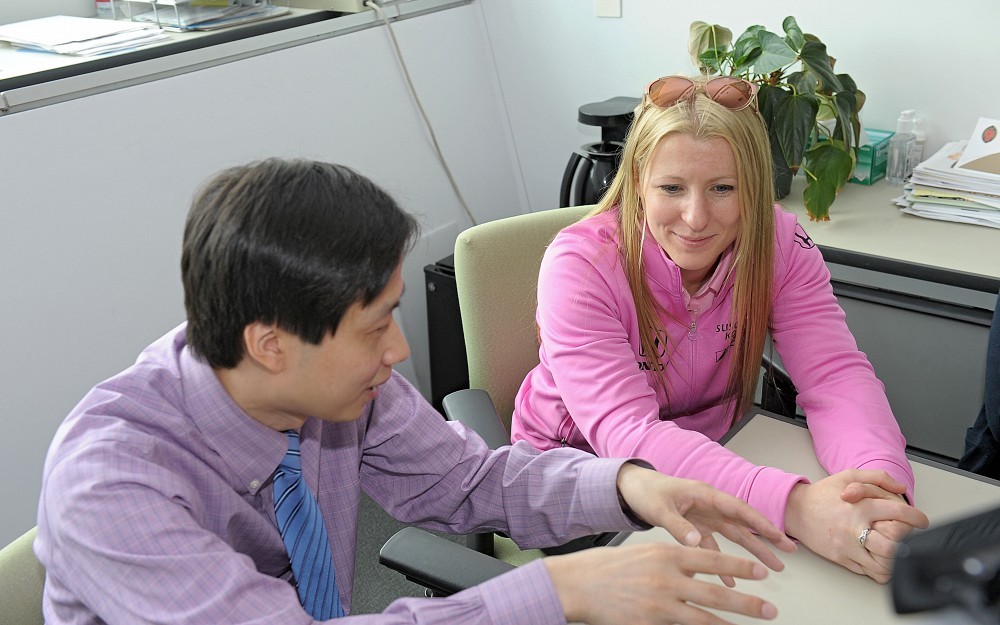
IndyCar Driver Makes Pit Stop at UC Cancer Institute
Just days before the 98th running of the Indianapolis 500, IndyCar driver Pippa Mann visited with researchers and clinicians at University of Cincinnati Cancer Institute.
Mann, who drives a pink Susan G. Komen Verizon IndyCar series car, partnered with the Susan G. Komen Foundation for a visit to the lab of Xiaoting Zhang, PhD, associate professor in the UC Department of Cancer Biology. The visit, held Tuesday, May 20, was part of the Indianapolis 500's annual media day, when each of the 33 drivers travel across the country to make appearances and meet with journalists.
Zhang is a Komen-supported researcher with the Cincinnati Cancer Center and UC Cancer Institute. He uses nanoparticles to study why certain cancers become resistant to the drug tamoxifen.
Following a tour of Zhang's lab in the Vontz Center for Molecular Studies, Mann visited clinicans at the UC Health Barrett Center. Elyse Lower, MD, director of the UC Cancer Institute's Comprehensive Breast Cancer Center and professor in the hematology oncology division at UC, led Mann on a tour through areas newly renovated through the Rooms that Rock for Chemo project.
Mann took to social media during her trip to Cincinnati and from her Twitter account ( @PippaMann), posted to her nearly 18,000 followers: "Amazing tour with @SusanGKomen co-sponsored researcher Dr. Zhang at @uofcincy. Massively important work. #breastcancer #500MediaDay."

Xiaoting Zhang, PhD (left), with IndyCar driver Pippa Mann.

Xiaoting Zhang, PhD (left), with IndyCar driver Pippa Mann and Elyse Lower, MD (right).
Tags
Related Stories
Ohio could soon make breast cancer screenings more affordable
May 9, 2025
The University of Cincinnati Cancer Center's Ann Brown was featured in Local 12 and Cincinnati Enquirer reports on a bill introduced by Rep. Jean Schmidt in the Ohio legislature that seeks to eliminate out of pocket medical expenses such as copays and deductibles associated with supplemental breast cancer screenings.
UC lab-on-a-chip devices take public health into home
May 8, 2025
University of Cincinnati engineers created a new device to help doctors diagnose depression and anxiety. The “lab-on-a-chip” device measures the stress hormone cortisol from a patient’s saliva. Knowing if a patient has elevated stress hormones can provide useful diagnostic information even if patients do not report feelings of anxiety, stress or depression in a standard mental health questionnaire.
Study explores social media’s growing influence on cosmeceutical...
May 7, 2025
The University of Cincinnati's Kelly Dobos spoke with Cosmetics Design USA about new research that revealed a significant rise in consumer interest in cosmeceuticals, or cosmetic products with active ingredients purported to have medical benefits.
